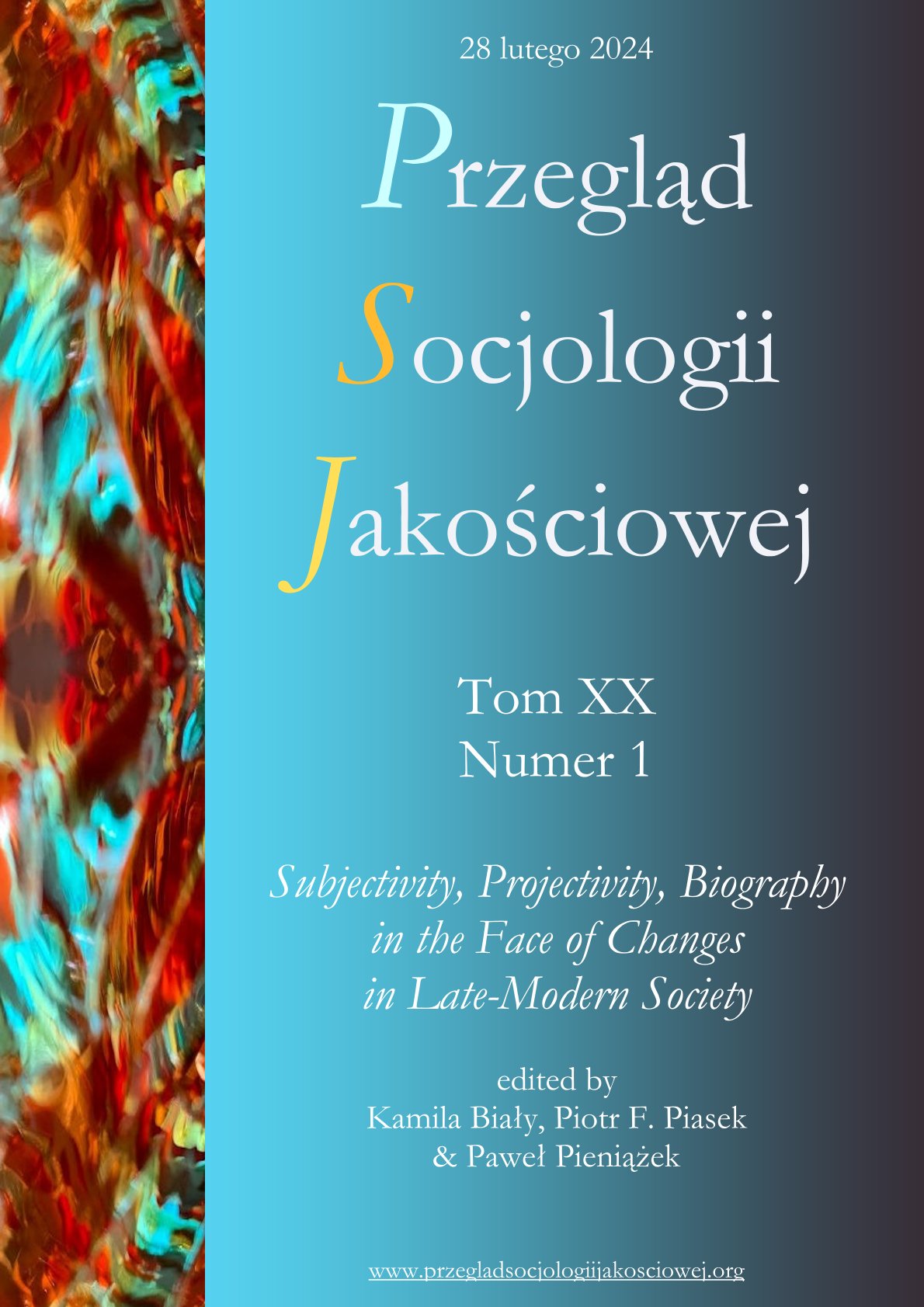On Social Emergence: A Non-Dichotomous Approach to Qualitative Data Analysis
DOI:
https://doi.org/10.18778/1733-8069.20.1.02Keywords:
non-dichotomous epistemology, emergence, subjectivity, narrative interview, interview about the presentAbstract
As part of our research project titled The Shaping of Subjectivity and Biographies of Individuals in the Face of the Transformations of a Neo-modern Society, data was collected with a tool of narrative interviewing focusing on the present experience. In this article, we propose a nondichotomous way of analyzing this qualitative material. The inspiration for creating the presented analytics is the epistemological position of the Gestalt psychotherapy as well as phenomenology (Merleau-Ponty and Waldenfels). The narrative interviews were aimed at theorizing (about) subjectivity in the biographies of contemporary Poles, but the analysis focuses not so much on depicting subjectivity as ‘basic agency’ – i.e. that which provides the possibility of action, interaction, self-narrating – but, rather, on seeing subjectivity as a component that emerges only in the long process of narration and interaction.
Downloads
References
Berger Peter L., Luckmann Thomas (1991), The Social Construction of Reality, London: Penguin Books.
Google Scholar
Biały Kamila, Haratyk Karol (2018), Outline of the Concept of Order-generating Dimensions: A Case of Hypermodernity in Polish Society of Late Capitalism, “Kultura i Społeczeństwo”, vol. 62(4), pp. 47–67.
Google Scholar
Biały Kamila, Piasek Piotr F. (2022), Towards Non-Dichotomous Sociology: A Phenomenologically Inspired Epistemological Analysis, “Avant”, vol. 13(2), https://doi.org/10.26913/avant.2202214
Google Scholar
Biały Kamila, Piasek Piotr F. (2024), On Social Emergence: A Non-Dichotomous Approach to Qualitative Tool Design, “Przegląd Socjologii Jakościowej”, vol. XX, no. 1, pp. 40–55.
Google Scholar
Blumer Herbert (1986), Symbolic Interactionism: Perspective and Method, Berkeley–Los Angeles–London: University of California Press.
Google Scholar
Böhme Gernot (2017), The Aesthetics of Atmospheres, London: Routledge.
Google Scholar
Bourdieu Pierre, Passeron Jean-Claude (1990), Reproduction in Education, Society and Culture, London–Newbury Park–New Delhi: Sage Publications.
Google Scholar
Callon Michel (1986), Some elements of a sociology of translation: Domestication of the scallops and the fishermen of St Brieuc Bay, [in:] John Law (ed.), Power, Action, and Belief: A New Sociology of Knowledge?, London: Routledge, pp. 196–223.
Google Scholar
Critchley Simon (2012), Infinitely Demanding. Ethics of Commitment, Politics of Resistance, London–New York: Verso.
Google Scholar
Durkheim Émile (1995), The Elementary Forms of Religious Life, New York–London–Toronto–Sydney–Tokyo–Singapore: Free Press.
Google Scholar
Foucault Michel (2005), The Hermeneutics of the Subject: Lectures at the Collège de France 1981–1982, New York: Palgrave Macmillan.
Google Scholar
Griffero Tonino (2016), Atmospheres: Aesthetics of Emotional Spaces, New York: Routledge.
Google Scholar
Han Byung-Chul (2015), The Burnout Society, Stanford: Stanford University Press.
Google Scholar
Jacobs Lynne (2017), Hopes, fears, and enduring relational themes, “British Gestalt Journal”, vol. 26(1), pp. 7–16.
Google Scholar
Latour Bruno (2013), An Inquiry into Modes of Existence, Cambridge–London: Harvard University Press.
Google Scholar
Merleau-Ponty Maurice (1968), The Visible and the Invisible, Evanston: Northwestern University Press.
Google Scholar
Perls Frederic, Hefferline Ralph, Goodman Paul (1951), Gestalt Therapy: Excitement and Growth in the Human Personality, London: Profile Books.
Google Scholar
Rosa Hartmut (2019), Resonance. A Sociology of Our Relationship to the World, Cambridge: Polity Press.
Google Scholar
Touraine Alain (2014), After the Crisis, Cambridge: Polity Press.
Google Scholar
Waldenfels Bernhard (2011), Phenomenology of the Alien. Basic Concepts, Evanston: Northwestern University Press.
Google Scholar
Wiesing Lambert (2014), The Philosophy of Perception: Phenomenology and Image Theory, London: Bloomsbury Academic.
Google Scholar
Published
Versions
- 2024-03-14 (2)
- 2024-02-28 (1)
How to Cite
Issue
Section
License

This work is licensed under a Creative Commons Attribution-NonCommercial-NoDerivatives 4.0 International License.
Funding data
-
Narodowe Centrum Nauki
Grant numbers UMO2017/27/B/HS1/00462














